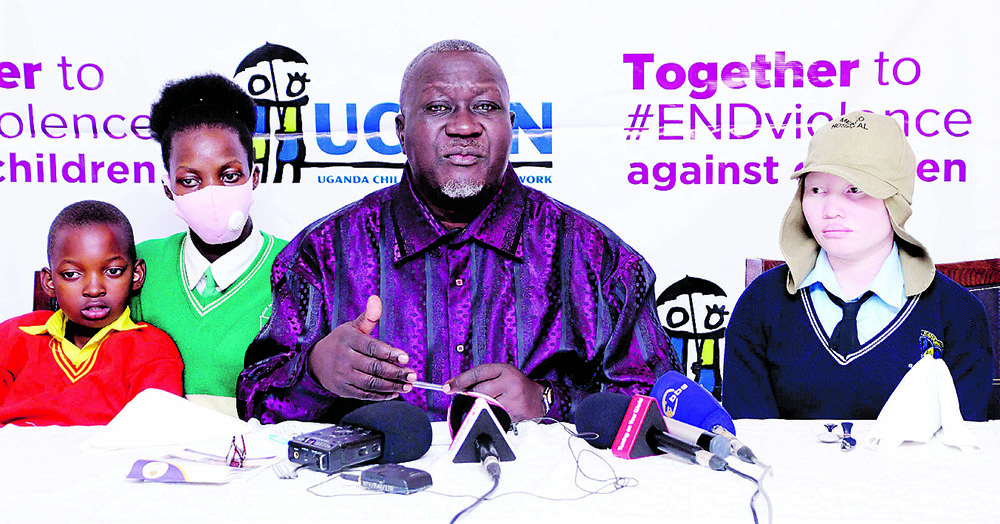Uganda loses sh711B to child abuse
Jul 02, 2022
Child abuse, according to UNICEF, can be physical, emotional, or sexual, and in many cases, children suffer at the hands of the people they trust.

Mondo kyateka (centre) gives a speech at a breakfast meeting with children from different parts of the country and policy makers. (Photo by Mirium Namutebi)
Cecilia Okoth
Journalist @New Vision
Uganda loses approximately sh711b to child abuse annually. The gender ministry commissioner for children affairs, Mondo Kyateka, said whereas this money could be used to better service delivery, the Government has had to pay the price of adults mistreating children in their various communities.
Kyateka said the cost of teenage pregnancy alone in this country amounts to sh634b while sh77b is lost to gender[1]based violence.
He made this revelation at a breakfast meeting organized by civil society organizations working on child protection at Imperial Royale Hotel in Kampala yesterday.
They include Early Child Ministries Uganda, Uganda Child Rights NGO Network, Dwelling places, and Inclusive Support Uganda.
The meeting held under the theme, Eliminating harmful practices affecting children is a continuation of the international day of the African child celebrated every June 16.
Child abuse, according to UNICEF, can be physical, emotional, or sexual, and in many cases, children suffer at the hands of the people they trust.
When child abuse, also called maltreatment, occurs in the home and the abuser is, for example, the child’s parent or carer, this is regarded as domestic violence.
But children are sometimes abused by other adults on whom they are dependent. These among others include teachers and other domestic workers.
“The issue of harmful practices against children is extremely endemic and it is giving us a lot of sleepless nights, not only harming the children who are the future of the nation, but it is also making us spend money where we ought not to,” Kyateka said.
A recent report conducted by a coalition of child rights non-governmental organizations revealed that more than half of Uganda’s children experienced physical or psychological violence from their guardians during the first COVID-19 lockdown.
The forms of physical violence, according to the report, included excess slapping, excess beating, punching, and kicking while psychological aggression included threatening to send them away from home, being shouted at, bullied, cursed, intimidated, or using belittling words like stupid, good for nothing, among others. Children constitute 60% (25.2 million) of Uganda’s 42 million population.
Whereas early marriages and teenage pregnancies are often talked about, Kyateka said other silent harmful practices prevent children from achieving their full potential.
“For instance, it is a bad practice to serve children last and less. You find a man my size being given four pieces of beef and the child a very tiny piece. What kind of greed is that?” he wondered.
The other bad practice Kyateka talked about was mothers not breastfeeding children. This he said was most common among young mothers who fear having flabby breasts. “Once you produce children, you must breastfeed them.”
What children want
Some of the children who spoke during the event urged the Government to strengthen local council structures to deliver services to vulnerable communities, employ social workers to provide guidance and counseling in schools as well as enforce the law against irresponsible fathers.
“I am epileptic. But my teacher uses my condition to make fun of me in class that I should have been called a curse,” said Bruno Mukisa, a secondary school student.
Christine Nabukenya, a student living with albinism, said she lived in fear of discrimination by society.
“The Government needs to sensitize the public about our condition so that we are treated like any other normal person.”
Victoria Nassanga, who was born into a family headed by a single mother, asked the Government to enforce a law on irresponsible fathers who neglect their children. “My father is alive and has a lot of money.
However, he has neglected my siblings and me since we were young. Because my mother could not afford school fees, I resorted to selling chips on the streets which affected my performance at school and my teachers told me to get married instead of wasting time with my studies,” Nassanga said.
How money is lost
The loss of money, Kyateka explained, is computed through the human resource the country misses out on, had the teenage pregnancy victim been given the chance to grow up and get employed.
“The Government incurs medical expenses because of the pregnant girl since her pregnancy is considered high risk for her body has not yet matured to the extent of carrying a pregnancy,” he said, adding that more money is spent on ensuring the teenager gets the required nutrition throughout the pregnancy.
The loss incurred as a result of GBV is mostly in terms of labor loss, Mondo said, adding that each person who has been battered or violated ends up in hospital. “The sick person cannot go to work, which is the employer’s loss,” he said.

No Comment